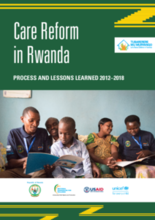Introduction
There is widespread global agreement that children should grow up safe and protected in families rather than in harmful institutional care. In Rwanda, the government has developed an ambitious programme of care reform and family strengthening that has seen over 3,000 children reunited with families and communities since 2012. This programme is rooted in Rwandan cultural values, which place a strong emphasis on family care. Interventions have included legislative reform, strengthening the professional and volunteer child protection workforce, distributing support packages to vulnerable families and developing foster care on a significant scale. This paper documents the care reform process and presents key lessons learnt. It is based on a review of Rwandan policy and programme documents and on interviews and focus group discussions with 65 stakeholders. A glossary of key terms is included as an annex.
Rwanda is frequently acknowledged as a global leader in alternative care reform, and it is hoped that the learning presented here will assist those engaged in children’s care and protection in Rwanda and beyond.
This paper is part of a package of materials documenting successes and lessons learnt from implementation of the child care reform programme between 2012 and 2018

